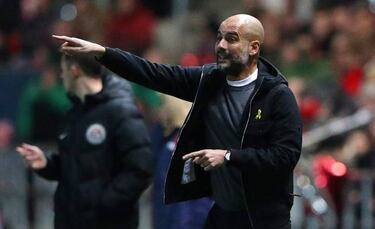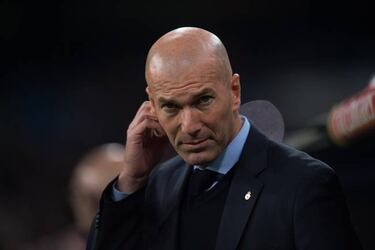Pep's permanent revolution and the rise of quixotic coaching
Managers with particular ideals are in fashion right now because if you don’t stand for something, the thinking goes, you’ll crumble at the first sight of adversity.

As Pep Guardiola moved from Spain to Germany to England, with just a brief pitstop in New York to recharge his batteries, on his tour of Europe’s biggest leagues, his aim was to conquer all before him. But by pure serendipity, as he has been making people fall in love with his approach to the game, and winning titles, he has also been forcing clubs into existential crises about how they think about football too.
In Paolo Condo’s book, The Duellists, about Pep and José Mourinho and their bitter row during their concurrent spells in Spain, he says the Catalan is a theorist of permanent revolution. “There is no formation that cannot be improved: once a team has tried a particular move it has already become obsolete, because a good opponent has already started to look for a counter-measure,” he says.
As teams around Europe look to counter Pep’s possession-based style, they are also forced into sometimes uncomfortable thinking about their own club’s thinking as they search for their own version of Pep Guardiola, with the idealist the pinnacle of footballing thought for many at the moment.

Clubs taking on financial muscle with 'thinkers'
“My problem at Barcelona was with one man, and that was the Philosopher,” said Zlatan Ibrahimovic in a derogatory way about his time at FC Barcelona and his contempt for Pep. José Mourinho echoed that last season by saying “there are lots of poets in football but poets, they don't win many titles,” but the fact is, teams are relying more on the ‘thinker’ now than ever before as they try to match financial muscle with mental reasoning. From Menottismo to Billardismo and everything in between, every manager will soon need to find their own philosophy as teams cry out for someone to save them from oblivion and the front pages of yesterday’s news.
In a recent issue of Spain’s hip football magazine Panenka, three managers grace the stylish cover in an obvious nod to Russia’s October Revolution: Asier Garitano, Pablo Machín and Gaizka Garitano - three young managers currently with Leganés, Girona and Athletic Bilbao’s B side, respectively, along with Julien Nagelsmann from Hoffenheim. Four coaches of teams who have plans, a faith in youth and a distinctive playing style. They could have as easily put a manager like Quique Setién on the cover, or Jose Bordalás or the returning Paco Jémez.
The article is centred on the revolution happening at modest teams and how these deep, principled men are fighting the explosion of money at the top of the game with mental logic and an undying belief in how they think football should be played by teams with more limited resources.
Rory Smith of The New York Times recently tweeted, “Managers are salesmen. For whatever reason - and the narrative conventions of reality TV are probably part of it - what they now have to sell is that they stand for something, have principles, represent a school of thought.” Football clubs have learned quickly that if the ideals are there, in theory anyway, it is cheaper to be competitive with a manager like this than to buy your way to the top, which is impossible in most cases anyway. Naomi Klein argues in her book ‘No Logo’ that companies are no longer selling you a product but a feeling, an idea. If football teams in the middle tiers can’t offer trophies, they have to be able to sell you something to get behind. A feeling, a project.
If Pep is at the vanguard, there are plenty of clubs watching closely for their own knock-off version of the Catalan and their own slice of system-thinking paradise. And if they can’t unearth a Pep, the work in recruitment and filling out the front office has been based around processes that make sense opposed to constant turnover as soon as a manager or important player departs. No longer do transfer policies screech to a halt when a manager's job comes into danger. The process and need for similar players remains the same regardless of who takes over as the team and the club are built around certain principles.
Liverpool are currently best placed to compete against Pep Guardiola and Manchester City in the Premier League. It's Klopp's ability to build buy-in with his system and his ideals that make this the most possible scenario in the coming years too. So, while Pep and Man City turn football on its head wherever they go, Guardiola is also slowly but surely sowing the seeds of revolution everywhere else because, well, you have to if you want to survive.

Zidane: A 'relationships coach'?
In a recent interview with Zach Lowe, a top NBA journalist, David Fizdale, at the time the coach of the Memphis Grizzlies basketball organisation, was asked about being a 'relationships coach'. He refuted it, and almost spat the words 'relationship scoach' out of his mouth with disgust. It sounds strange to question a manager who has won so many titles in the last year, but Zinedine Zidane is in serious danger of becoming known as just that. as his principles around football have been difficult to decipher.
Take a look at one of those managers at the vanguard of these new philosophically-fuelled teams, Jose Bordalás’ Getafe, playing against a Barcelona team that is worth close to 1 billion euros and three hundred million less than Manchester City. But they recently pushed Barça to the pin of their collar, with only second half goals from two substitutes turning the game in Barca’s favour. Likewise, against Real Madrid it would take a Ronaldo goal in the 85th minute to break the deadlock against Bordalás’ side. They also inflicted Valencia’s first defeat of the season and have a very clear personality under Bordalás, having previously been ridiculed for their lack of identity. They have pushed their critics into the shadows with their new-found approach. It’s no surprise that teams like Setién’s Betis, and Machín’s Girona have taken all three points from Real Madrid this season with Zidane looking lost in both instances when both sides had their set-up in place with Setien’s possession-based game and Machin’s 3-5-2 covering all angles against even the might of Los Blancos.
Related stories
These ideals, it should be pointed out, can sometimes become obstacles when the tide turns and a swift injection of pragmatism is needed but with people in place in the right positions at these clubs to harbour long-sighted thinking, the process and recent results should be compartmentalised with the bulk of the scrutiny saved for the job interviewing process.
The Premier League clubs are responding to Pep Guardiola's revolution with a series of counter-measures, with the mid to lower tier teams trying to think their way out of being left behind. Managers with particular ideals are in fashion right now because if you don’t stand for something, the thinking goes, you’ll crumble at the first sight of adversity.
